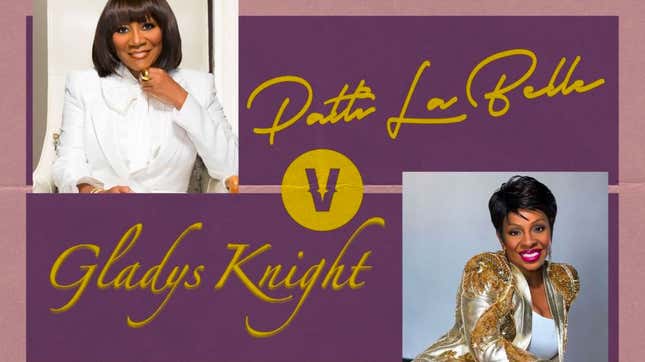

It’s a cliche to assess a clash of titans for its sheer entertainment value and conclude, “We all won,” but I truly cannot think of a better way to describe the outcome of the Patti LaBelle/Gladys Knight Verzuz battle that went down Sunday night. For more than two hours, two legends of soul and decades-long friends sat across from each other, trading reminiscences, compliments, and music, in a live-streamed sit-down that was heavy on affirmation and low on combat. This Verzuz was the rare culturally agreed-upon must-see event that centered veteran Black women musicians who both been in the industry for over 60 years, and, as a result, was a pure and utter joy.
“You know what? When people meet me and they say, ‘Ooh, we love you so much,’ and they say, ‘We love Gladys the same,’” LaBelle said, in one of several moments of effusive praise for her nominal rival. For her part, Knight named off several of LaBelle’s songs as her “No. 1 favorite” and several more as one of her favorites. Both singers sang along to each other’s hits as they played. (In the clip above, LaBelle also gives a shout out to their gay fans—“Ooh, thank you gay people…they love us.” Knight laughed her basso laugh in agreement.)
As per the format of Verzuz, hit songs (and other favorites) by each singer played one after the other—roughly…in a few instances, LaBelle’s songs ran back to back. Chair-dancing ensued. Knight opted to sing most of her songs, sometimes to instrumental versions. She talked several times about her voice deepening over the years, but her contralto was strong and clear. LaBelle sang less—lines here, versus there—and the relaxed, sit-down nature of this forum wasn’t exactly the proper medium for LaBelle’s typical high-octane performances. In her excellent 1996 memoir Don’t Block the Blessings, LaBelle recalls a review that described her concerts as “one part revival, one part nervous breakdown,” and admits that she can’t argue with that.
“Sometimes I think I oversing,” said LaBelle. Knight protested. “Sometimes I think I do, but God gave me this.” “It’s what you feel,” responded Knight. “I have this large, big mouth, and I like it,” said LaBelle. “It’s power,” Knight told her.
While most of what you’d expect to hear was played, there were some notable omissions, including two of Knight’s biggest hits, “I Heard It Through the Grapevine” and “If I Were Your Woman.” (Also “Midnight Train to Georgia” played twice, in slightly different versions.) LaBelle’s set left out her disco-soul classic “Music Is My Way of Life,” her Teddy Riley-produced 1994 cover of DeBarge’s “All This Love,” and included just one song from each of the girl groups that preceded her solo career, the Bluebelles and LaBelle. A playlist of the Verzuz songs in the order that they were played is below:
Also missing was LaBelle’s classic comedy of errors/“Where My Background Singers?” version of “This Christmas” at the 1996 National Tree Lighting. However, when “Love, Need, and Want You” began to play, a moment of similar flustering approached when apparently the teleprompter displayed lyrics to a different song. Another classic moment of Patti LaBelle’s boiling blood:
Probably worth pointing out that the opening lyrics of “Love, Need and Want You” are the, ahem, rather repetitive: “I love you, I love you honey / I love you, I do, more than you ever know.”
It was the between-song banter that I lived for: like LaBelle’s rhapsodizing her flip phone. “I love my flip,” she said. “I’m very low-key. You won’t misdial on no flip. Okay?”
The platonic ideal of content, at least in my world, occurred as Knight was concluding her 1987 hit “Love Overboard.” “I don’t know what to do,” she said, pacing. “I don’t know what to do. I’m just deep in.” She and LaBelle proceeded to shoot the shit like they had all the time in the world and no one was watching. “Oh what a night,” said Knight, taking her seat. “It’s a wonderful night,” LaBelle agreed. “Who woulda ever thought?” said Knight. “Not many people,” answered LaBelle.
After Knight expressed her hope that people really get something out of the night’s show, they discussed portraying life in their music and then shared a quiet moment when, from stage left, the unmistakable throaty cackle of Dionne Warwick rang out. “Whatcha’ll doin’ over there?” Knight called out. “Y’all in the corner doing something over there.” Then one of LaBelle’s signature songs, “You Are My Friend,” started and after LaBelle sang the titular first line, Knight turned to her and answered into her mic, “Yes I am.”
Just watching them exist was riveting and I could have done it all night, even if they didn’t play a note of music.
They eventually brought out Warwick for two songs, a somewhat chaotic “That’s What Friends Are For” and a remake of Karyn White’s “Superwoman,” which they recorded together and released in 1991. “Hello, everybody!” said when Warwick upon taking the stage.
When they were done the songs, Dionne said, “So what are we gonna do now? Can I go and change and put my jeans back on?” She could and she eventually made her way from the stage with the meandering of someone saying goodbye to her friends outside the club at 4:30 am.
In sum, it was an extraordinarily entertaining show, an embarrassment of riches not only because of the classic soul catalogs on display but due to the enormous presences of music legends. What a beautiful thing for an industry that is often rightly called out for his ageism, sexism, and racism that for over two hours on a Sunday night, two Black women well into their 70’s (and a third, Warwick, who will turn 80 in December) were the biggest story in music. More of this, please.